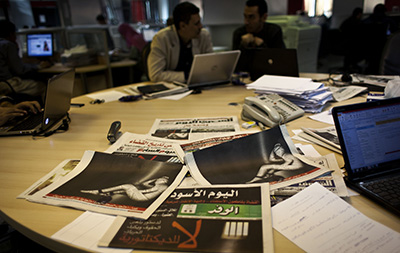New York, December 4, 2012–The proposed Egyptian constitution would impose several new restrictions on press freedom–including the creation of a new government regulator and new governmental authority to shut media outlets–while doing nothing to halt the criminal prosecution of journalists, which was a hallmark of the Hosni Mubarak regime, the Committee to Protect Journalists said today. CPJ supports the Egyptian Journalists Syndicate’s call to President Mohamed Morsi to withdraw the proposal from the referendum scheduled for December 15.
The Egyptian Constitutional Committee approved a draft of the constitution on Saturday. Local and international press freedom organizations including CPJ have found that the document places severe restrictions on freedom of expression while claiming to guarantee free speech. Other civil society groups have raised concerns about the proposal’s lack of protection for minority rights and freedoms.
“We support the right of journalists to seek protection under this new constitution,” said CPJ’s Middle East and North Africa Program Coordinator Sherif Mansour. “We call on President Mohamed Morsi to work with civil society and press freedom groups to craft a constitution that truly guarantees freedom of expression and eliminates restrictions in the current draft.”
Although Article 45 says broadly that “freedom of thought and opinion shall be guaranteed” in the constitution, several articles appear to contradict the provision, including Article 44, which prohibits “the insulting of prophets.” Under the current penal code, the government can prosecute critics like blogger Alber Saber, who has faced trial since September for “insulting the religion” and “insulting the president.”
Article 215 replaces the Higher Council for Journalism, an elected body of journalists, with the National Media Council and government appointees, which is required to “establish controls and regulations that ensure the commitment of the media to adhere to professional and ethical standards” and “to observe the values and constructive traditions of society.” CPJ believes that this vaguely defined mandate would give the new government agency the authority to control and guide editorial coverage and news.
Article 48 allows a court to shut down a media outlet if a judicial review finds an employee of the outlet has not respected the provisions of the article, including “respecting the sanctity of the private lives of citizens and the requirements of national security.”
Article 216 announces the creation of an agency called the National Press and Media Association that would manage state-owned media outlets. The article does not specify how the members would be selected or offer details on how the agency would ensure the media would adhere to “sensible, professional, administrative, and economic standards.” Local journalists fear this agency could end up serving the Muslim Brotherhood party, similar to how the Shura Council in July appointed members of the Muslim Brotherhood to leadership positions in media outlets.
The proposed constitution does nothing to halt the practice of imprisoning journalists for press-related offenses, despite the Egyptian Journalists Syndicate repeatedly asking the constitutional committee to include such a provision. Under the current penal code, journalists can be criminally prosecuted for defamation, like Egyptian TV commentator Tawfiq Okasha, who was given a jail term for defamation in October, according to CPJ research.
Local press freedom organizations, including the Egyptian Journalists Syndicate, announced a press strike today to protest the bill, news reports said. Several private newspapers, including Al-Watan, Al-Tahrir, Youm7, and Al-Wafd, ran blank front pages on Monday with the headline “No to dictatorship,” news reports said. News accounts also reported that several local TV outlets have announced a strike tomorrow to protest the constitution.
Thousands of demonstrators protested in front of the presidential palace today, demanding that the referendum be postponed until a new constitution had been drafted, news reports said.
- For more data and analysis on Egypt, visit CPJ’s Egypt page here.
